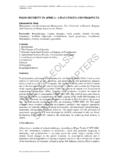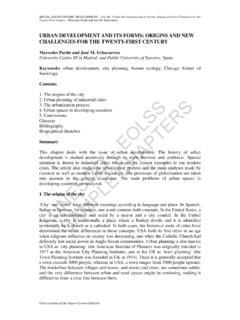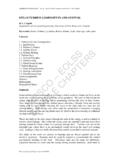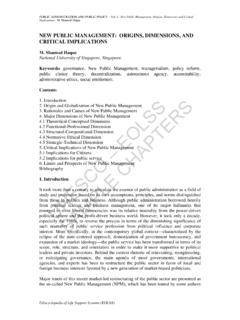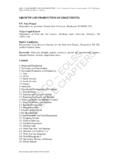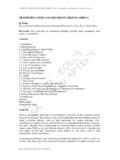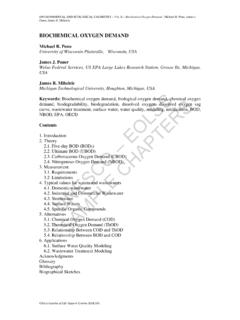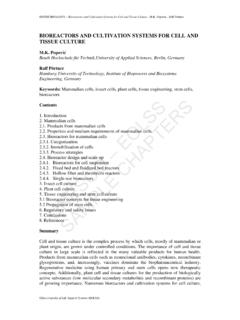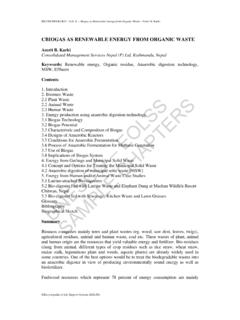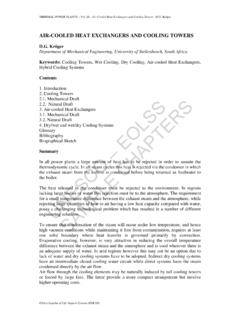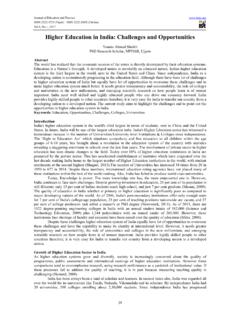Transcription of Security Threats, Challenges, Vulnerability and Risks
1 UNESCO EOLSSSAMPLE CHAPTERSINTERNATIONAL Security , PEACE, DEVELOPMENT AND ENVIRONMENT Vol. I - Security Threats, challenges , Vulnerability and Risks - Hans G nter Brauch, Encyclopedia of Life Support Systems (EOLSS) Security THREATS, challenges , Vulnerability AND Risks Hans G nter Brauch, Otto-Suhr Institute for Political Science, Free University of Berlin, Germany. Keywords: Beck, Ulrich; climate change community, cold war, disaster, disaster risk, environmental conflict, environmental degradation, environmental scarcity, environmental Security and stress, global change community, global environmental change, hazard community, New Millennium, reconceptualizing Security , risk, risk assessment, risk management, risk society, Security challenge, Security risk, Security threat, Security Vulnerability .
2 Contents 1. Introduction: Four Security Dangers: Threats, challenges , Vulnerabilities and Risks 2. Impact of Global Contextual Change since 1990 and of Scientific Change on Reconceptualization of Security Global Contextual Change as a Cause for Reconceptualizing for Security Scientific Innovation and Reconceptualization of Security Widening and Deepening of Security : Environmental and Human Security Concept 3. Reconceptualizing Security Threats after the Cold War Etymological Origins of the Term Threat Security Threats as a Political and as a Scientific Concept during the Cold War Security Threats as a Political and as a Scientific Concept after the Cold War Environmental Security Threats in the New Millennium 4. Reconceptualizing Security challenges after the Cold War Etymological Origins of the Term Challenge Security challenges as a Political and as a Scientific Concept after the Cold War Environmental Security challenges in the New Millennium 5.
3 Reconceptualizing Security Vulnerabilities after the Cold War Etymological Origins of the Term Vulnerability Vulnerability as a Political and as a Scientific Concept in the Academic Literature Vulnerability as a Scientific Concept in the Global Change Community Vulnerability as a Political and as a Scientific Concept in the Climate Community Vulnerability as a Political and as a Scientific Concept in the Hazard Community 6. Reconceptualizing Security Risks after the Cold War Etymological Origins of the Term Risk Risk as a Political and as a Scientific Concept in Encyclopedias Risk as a Political and as a Scientific Concept in Scientific Dictionaries The Debate on Risk and Risk Society in the Social Sciences The Debate on Risk , Risk Society and Risk Policy in Political Science Global and Regional Environmental Risk as a Scientific Concept Risk as a Scientific Concept in the Hazard Community Risk as a Practical Concept in the Hazard Community 7.
4 Conclusion Acknowledgements Glossary UNESCO EOLSSSAMPLE CHAPTERSINTERNATIONAL Security , PEACE, DEVELOPMENT AND ENVIRONMENT Vol. I - Security Threats, challenges , Vulnerability and Risks - Hans G nter Brauch, Encyclopedia of Life Support Systems (EOLSS) Bibliography Biographical Sketch Summary Four Security dangers are distinguished: threats, challenges , vulnerabilities and Risks . Two developments have influenced the reconceptualization of Security since 1990: a) the global contextual change with the end of the Cold War and b) constructivist approaches in the social sciences. This dual change had a direct impact as to how Security threats, challenges , vulnerabilities and Risks have been reconceptualized during the 1990s and in the new millennium.
5 Below, first the etymological origins, the synonyms and meanings of the four terms threats, challenges , vulnerabilities and Risks in contemporary English will be analyzed, then definitions of these concepts in scientific dictionaries and encyclopedias as well as in key publications will be reviewed. With the end of the cold war, the relatively simple concept of Security threats was increasingly replaced by references to new Security challenges and Risks , partly with references to the high degree of Vulnerability of modern societies to attacks by non-state terrorist actors. The concepts of Vulnerability and Risks are not only used in the context of foreign and defense policy, but also with regard to environmental Security challenges by the global environmental change, the climate change and the hazard and disaster communities, where no consensus within and among these communities exists on the meaning of Vulnerability and Risks .
6 This survey of the conceptual thinking on Security threats, challenges , vulnerabilities and Risks has stressed a dual need for: a) more precise definitions and for a consensus on these concepts especially with regard to practical political measures to achieve the agreed goals; and b) a systematization of the threats, challenges , vulnerabilities and Risks for military, diplomatic, economic, societal, environmental as well as human, food, health, energy, livelihood, and gender Security . 1. Introduction: Four Security Dangers: Threats, challenges , Vulnerabilities and Risks Today Security as a political value has no independent meaning and is related to individual or societal value systems.
7 Wolfers (1962) pointed to two sides of the Security concept: Security , in an objective sense, measures the absence of threats to acquired values, in a subjective sense, the absence of fear that such values will be attacked . Thus, in its double meaning Security refers to an absence of objective dangers, of threats, challenges , vulnerabilities and Risks , and of subjective fears, and subjectively to the perception thereof. Objective Security is achieved if the dangers posed by manifold threats, challenges , vulnerabilities and Risks are avoided, prevented, managed, coped with, mitigated and adapted to by individuals, societal groups, the state or regional or global international organizations. This article tries to clarify the four specific Security dangers that are posed for the five Security dimensions (military, diplomatic, economic, societal and environmental) by: a) Security threats; b) Security challenges , c) Security vulnerabilities, and d) Security Risks .
8 UNESCO EOLSSSAMPLE CHAPTERSINTERNATIONAL Security , PEACE, DEVELOPMENT AND ENVIRONMENT Vol. I - Security Threats, challenges , Vulnerability and Risks - Hans G nter Brauch, Encyclopedia of Life Support Systems (EOLSS) What do we mean with threats, challenges , vulnerabilities and Risks that pose dangers for Security ? How have these words been used in common English language and how are they being used as scientific concepts in the social and natural sciences relevant for the different dimensions of Security ? 2. Impact of Global Contextual Change since 1990 and of Scientific Change on Reconceptualization of Security The international political reality and the threats, challenges , vulnerabilities and Risks for peace and Security we perceive depend on our worldview, our conceptual models and theoretical concepts but also on our mindsets that are influenced by our traditions, experience and by the media that select the facts and interpret the images of the world that constitute reality for us.
9 Thus, both the scientific concepts we use and the reality we perceive through our conceptual lenses, and which we interpret with our concepts, models and theories, are socially constructed. For a rethinking or a reconceptualization of the Security concept (see: Reconceptualizing Security From National to Environmental and Human Security ) and of its associated features: threats, challenges , vulnerabilities and Risks two events have been instrumental: (1) the change in international order triggered by the two events of 11/9 (fall of the Berlin wall) and 9/11 (terrorist attack on USA), and (2) a paradigmatic shift in the social sciences from positivism to constructivism and towards concepts of a (world) risk society (Beck 1986, 1998).
10 Global Contextual Change as a Cause for Reconceptualizing for Security With the end of the Cold War, the global turn of 1989-1991 overcame the bipolar world order based on nuclear deterrence concepts of mutual assured destruction. For Abdus Sabur (2003), the end of the Cold War and the accompanying structural changes of monumental proportion introduced a revolutionary change in Security thinking that resulted both in a dramatic decline in traditional Security threats and to a series of intra-state conflicts, large-scale atrocities and genocide. The new Security agenda included: intra-state conflict, ethnic-religious violence, landmines, terrorism, democracy, human rights, gender, crime, poverty, hunger, deprivation, inequality, diseases and health hazards, human development, economic Security , markets, water, energy, migration, environmental degradation and so on.
